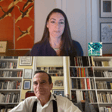Become a Creator today!Start creating today - Share your story with the world!
Start for free
00:00:00
00:00:01

Leslie Chats with Benedetta Berti on NATO, Hybrid Warfare, Infrastructure Risks, and Energy Security
As energy infrastructure becomes a battlefield for hybrid threats, NATO is rethinking how to defend its member states beyond traditional warfare. In this special episode, Leslie Palti-Guzman speaks with Dr. Benedetta Berti, Director of Policy Planning at NATO’s Office of the Secretary General.
Together, they explore:
- Why energy security is central to NATO’s collective defense
- The growing threat of sabotage, cyberattacks, and underwater cable disruption
- Strategic vulnerabilities in energy grids, shipping routes, and military fuel logistics
- NATO’s evolving stance on hybrid warfare and systemic challenges posed by China
Also we deep-dive on NATO’s deterrence strategies, and the economic upside of defense-industrial innovation.
Available on Spotify, Apple Podcasts, YouTube, and all major podcast platforms.
This episode was recorded on July 10, 2025
Transcript
Intro
Introduction to Energy Vista Podcast
00:00:59
lpaltiguzman
Welcome to Energy Vista, a podcast on timely energy issues, personal and professional trajectories. A podcast where we make experts great again and contribute actively to the public debate and policymaking around commodities, the geopolitics of energy and trade. I'm your host, Leslie Palti-Guzman.
Meet Dr. Benedetta Berti from NATO
00:01:21
lpaltiguzman
It's July 10, 2025, and time for a new Energy Vista episode. Today I'm exchanging with Dr. Benedetta Berti, Director of Policy Planning at the NATO's Office of the Secretary General.
00:01:35
lpaltiguzman
She brings a unique perspective at the intersection of strategy, diplomacy, and resilience and defense.
Energy Security and Infrastructure Threats
00:01:42
lpaltiguzman
um As a disclaimer, Benedetta and studied together, we met actually 20 years ago, and at the dorm of the Fletcher School on the campus of Tufts University, where most international students stay at least for a year out of the two years and where we fond memories.
00:02:02
lpaltiguzman
But today we're here to discuss a much more serious topic, NATO, energy security and infrastructure under threat. Hi Benedetta.
00:02:11
Benedetta
Hello Leslie, nice to see you.
00:02:14
lpaltiguzman
Good to see you. um So hybrid warfare is not new, but I feel that since Russia's invasion of Ukraine, we witnessed a real surge in attacks of those infrastructure where we see blurring the lines between military aggression and covert disruption.
00:02:34
lpaltiguzman
And one of the most alarming trends for me has been to to observe that it has targeted critical energy infrastructure. some pipeline explosion, undersea power cables cut, and even some manipulation of energy prices to destabilize societies.
00:02:54
lpaltiguzman
So as we see more war coming back at the forefront around the globe and also geoeconomic rivalries, including with China, we may enter a new phase of energy security, a new era, where it's not just about securing supply,
00:03:11
lpaltiguzman
or looking at the demand picture, but it's also about national national resilience, protecting those critical infrastructure, ah shipping actually also securing shipping lanes, and maybe offering some kind of deterrence.
00:03:26
lpaltiguzman
So I'm very excited to speak with you because you you bring a unique perspective here and you're the forefront of thinking about all those topics.
Why is Energy Security Crucial for NATO?
00:03:35
lpaltiguzman
um So my first question is,
00:03:38
lpaltiguzman
Why and is ener energy security now part of the NATO collective defense strategy?
00:03:45
Benedetta
Right. um Well, I think you have actually, your your introduction, I think, was really beautifully summarized. I think all the reasons why energy security really matters ah to to collective defense, which is NATO's core core mission, right? To ensure the collective defense of allies.
00:04:06
Benedetta
And I think you can unpack it in different layers. at the most basic The most basic layer would be our militaries need to have safe secure energy supply in order to operate effectively. So that's your more operational level. And in that sense for NATO, it's always been important to monitor and ensure that our militaries have the right energy, can rely on the right energy networks to operate effectively. So that's that's number one. you can You can have the most, the best equipped, best trained militaries in the world, but once it comes to
00:04:43
Benedetta
open to deployment, they also need to rely on secure energy supplies. And that involves also looking at the security of pipelines and the security of the energy infrastructure at large. So I would say that's that's step one. we We need to have...
Resilience of Civilian Infrastructure
00:04:59
Benedetta
a safe and secure energy supply because our military depend on it to operate effectively. And of course, that means looking at a civilian infrastructure because in all of our countries, energy suppliers and supply chains are civilians.
00:05:15
Benedetta
So I would say that's step.
00:05:16
lpaltiguzman
But actually, but if I can follow up on this, because it's I think an angle that is often underestimated is in time of war, um the military needs the logistics of energy also, like to be fueled, you know, whether naval, the airplanes, the tanks...
00:05:17
Benedetta
is it
00:05:33
Benedetta
correct
00:05:38
lpaltiguzman
So in that regard, um is the supply chain of fuel to the NATO military, is it ah how would you characterize it right now? Is it vulnerable? Is it on the way to be less vulnerable?
00:05:54
Benedetta
I think there's been, first of all, you're absolutely correct. And that's why when we talk about what do we need to enable our collective defense, we talk about mission critical enablers.
00:06:06
Benedetta
We really talk about ah the resilience of our critical infrastructure at large. And particularly it's ah In order for our militaries to be able to operate effectively through peacetime crisis and conflict, we need to they need to rely on what is essentially civilian commercial operators when it comes to transport.
00:06:28
Benedetta
That's just as important. Imagine your roads, your bridges, your airports, those need to be safe and secure.
00:06:33
lpaltiguzman
Mm-hmm.
00:06:35
Benedetta
Your energy infrastructure, so transport energy, digital infrastructure, digital comms, and also civilian satellites. These are the bare minimum requirements when it comes to being able to operate effectively as a military.
00:06:49
Benedetta
So that's why for NATO, we talk so much about the importance of resilience as a key enabler for collective defense. And when we talk about resilience, we're thinking about the physical infrastructure,
00:07:01
Benedetta
in in the energy case, but also the digital. And I think for the energy sector's energy security, you can look at you can look at the whole and the whole spectrum, right? From the did from the physical infrastructure, from those people pipelines, from those undersea cables, through the digital technology that is utilized to to operate our energy infrastructure, and energy grids. and As you rightly pointed out, there are vulnerabilities.
00:07:28
Benedetta
we all we Those are not new. But I think in recent years, there's been an increased effort to clearly map those vulnerabilities, identify them, and mitigate those moral vulnerabilities. So that's something that NATO is actively doing and individual NATO allies are actively doing because I think we are learning just from Russia's war. If we look at Russia's war against Ukraine, you can see how,
00:07:56
Benedetta
deliberately targeting civilian infrastructure, including energy infrastructure, has been used as a key tactic of warfare. And that's also and that has multiple purposes, right? it know It inflicts military damage, but it also ah inflicts pain on the civilian population, and it also undermines the economic functioning of the country, so its viability.
00:08:19
Benedetta
So we can see why protecting critical infrastructure, including energy, is so crucial, especially in a time, and you mentioned this in your introduction, of strategic competition where we see that actually we're being targeted more and more in the non-kinetic, right?
00:08:37
Benedetta
Through sabotage, through ah through below the threshold of armed conflict attacks. So
When Does an Infrastructure Attack Become an Act of War?
00:08:43
Benedetta
yeah, I would say.
00:08:43
lpaltiguzman
So, yeah, so with what you just mentioned, is there a point now where NATO says, okay, this event is actually an act of war? Like, let's say, I'm making it up, obviously, but let's say tomorrow there is an attack on the Norway pipeline that supplies Europe.
00:09:02
lpaltiguzman
one of Norway right now is the largest natural gas supplier to the European Union. and So let's say there is an attack on this pipeline. does it constitute an act of war?
00:09:15
Benedetta
Well, I get that question a lot because it's a really important one. essentially And there is no yes or no answer, I'm afraid, ah bottom line up front. But if if you look at the the draft, those who wrote the North Atlantic Treaty in 1949, they were very smart, in my opinion, because the way they wrote Article 5 essentially talks about ah the need... the need for countries to work together shoulder to shoulder to respond to armed attack.
00:09:47
Benedetta
That armed attack isn't defined precisely. And that has been, I think, a key strength of NATO because of course, if you go back to 49, what they were thinking in their head when they wrote Article 5 was of course a situation of conventional or God forbid, nuclear confrontation between NATO countries and the Soviet Union. and But they didn't make it explicit by talking about conventional threshold or any threshold for that matter, leaving very much the core of the decision to to the political the deliberation of the alliance.
00:10:21
Benedetta
and In fact, if you think about it, the only time that Article 5 has been invoked in the past 76 years was after 9-11, a response to a terrorist attack, which certainly was not in the imagination of the of the drafters, right?
00:10:31
lpaltiguzman
Yep.
00:10:36
Benedetta
But in the last few years, just to complement a little bit, What I've said, NATO allies have made a few important political statements. For example, they have mentioned they have clearly stated that an Article 5 situation can arise out of the an attack in from all our operational domains. So that's space, cyberspace, land, air, and sea. And that includes includes a declaration that attacks in, from, and within space could also trigger Article 5.
00:11:10
Benedetta
um In the same vein, they've also mentioned that a severe crippling hybrid attack could be considered and indeed as an act of war. So there is no immediate, the the threshold is not defined clearly because of course it' there it would have to be the result of a political decision.
00:11:29
Benedetta
And also you do not want to tell your adversary exactly how much pain they can inflict on you before you react.
00:11:36
Benedetta
So there is some logic behind the behind the ambiguity. But I think it's been clear that um sustained, ah cumulative, crippling, hybrid ah attacks could could very much trigger a discussion around collective defense.
00:11:36
lpaltiguzman
yeah
00:11:54
lpaltiguzman
and And so following like what we saw around the North Stream, the five branches of North Stream explosions, then some attacks on the Baltic connectors, the Baltic undersea cables.
00:12:10
lpaltiguzman
ah Has NATO taken taken some um decisions to increase
NATO's Enhanced Deterrence Efforts
00:12:17
lpaltiguzman
deterrence? like
00:12:20
Benedetta
I would say that in recent years, yes, yet METO has taken concrete steps to um more actively contribute to the security of our undersea cables, to deter potential adversaries and competitors from attacks, sabotage, but also to enhance our collective situational awareness.
00:12:41
Benedetta
So just to give you a few examples.
00:12:42
lpaltiguzman
it's more yeah exactly more sentinel like you know naval presence and
00:12:44
Benedetta
Yeah.
00:12:49
Benedetta
Correct, all of the above. So very practically, it starts with ah this je since this January, the the Baltic-centric mission, essentially increasing the amount of patrolling in the Baltic Sea in cooperation with the Baltic Sea allies, a very concrete way to ah increase our ability to detect patrolling potential ah hostile actions, a very concrete way to enhance deterrence through increased presence, but also a way to support law enforcement by um individual allies simply by having a much more extensive coverage and presence at sea, but also in the air.
00:13:36
Benedetta
to to collect relevant information. In addition, NATO's in over the last couple of years has also set up, first of all, here at the NATO headquarters in Brussels, a cell that works on and on the security of undersea infrastructure.
00:13:52
Benedetta
And this this this hub essentially works to connect NATO with national governments and representatives from industry to make sure that we have that cooperation that is very much needed because here we're talking about a mission that is very hard, if not impossible to undertake without strong partnership with the private sector and the commercial operators and to do to to have better situational awareness, monitoring, but also ability to repair and react.
00:14:16
lpaltiguzman
No.
Nuclear Deterrence and Inter-Allied Cooperation
00:14:22
lpaltiguzman
yeah
00:14:23
Benedetta
And then in our maritime command, we have a maritime command and in the United Kingdom, and they've also set up a cell that essentially looks at bringing together the intelligence from different allied countries so that we have a much stronger situational awareness of potential threats at sea.
00:14:40
Benedetta
So through all these measures, you can see that there's been an increased awareness, attention, but also action through deterrence and vigilance.
00:14:48
lpaltiguzman
Yeah.
00:14:50
lpaltiguzman
Talking about the UK, I saw an announcement today that France and the UK wanted to collaborate closer around nuclear deterrence. There are not that many nuclear power within NATO, I mean, a few, but do you think that ultimately this is the best deterrence that could happen for like you know um and enemies that are ah applying those hybrid threats? Yeah.
00:15:16
Benedetta
Well, I mean, i would say from a NATO perspective, we are very we are very clear that ae NATO's deterrence and defense posture is based on a mix of nuclear, conventional and missile defense.
00:15:33
Benedetta
But and at the very core, the ultimate guarantee of life security are is our nuclear deterrence. So it's something that it's very important. It has been very, very important to NATO's doctrine for the past 70 plus years.
00:15:46
Benedetta
ah mayte As you know, within the NATO alliance, we have three nuclear powers, the United States through also its forward deployed countries. and nuclear nuclear arsenal and on in Europe and, of course, the independent nuclear assets of the United Kingdom and France.
00:16:05
Benedetta
I haven't looked at the details of this particular announcement, so I cannot really ah speak to that. But in general, of course, when our allies are able to cooperate more and and enhance their um They're deterrent mutual cooperation and sharing of information. That's something that makes the whole alliance stronger. So it seems like seems to me like a a welcome development, especially in an age where unfortunately we see that the security environment is really more complex and more dangerous than than it has been for years.
00:16:40
lpaltiguzman
Yeah.
China as a Systemic Challenge
00:16:40
lpaltiguzman
A few months ago, one of your reports, I think, mentioned the threat of China. for One of the first time like for NATO to consider China as a future threat um to the alliance and the security.
00:16:54
lpaltiguzman
and So as China grows potentially as more a joke economy competitor, rival, um do you see how do you see security in ports, in grids and supply chain? And what what is the role of NATO in in that regard?
00:17:12
Benedetta
Right. So maybe two different points. Firstly, you are you are very much correct that NATO has historically not not focused on um on China and it remains today an alliance focused on the Euro-Atlantic area and ah with the main threat, the main direct threat for NATO being the Russian Federation and the enduring threat of terrorism.
00:17:37
Benedetta
That said, in our latest in that in the last NATO strategy, which was published in 2022, our strategic concept, we do talk about the People's Republic of China as a systemic challenge. and There, the focus really is on peer on the PRC's actions in your or in the Euro-Atlantic area through, for example, ah hybrid hybrid activities, malicious cyber attacks, but also through ah the creation of strategic dependencies.
00:18:09
Benedetta
And so that's so there is certainly a recognition that it is important to monitor the challenge and to build resilience against hybrid threats.
00:18:19
lpaltiguzman
Right.
00:18:22
Benedetta
no matter no matter whether they're originating from state or non-state actors for that matter. And then there's also recognition, and I think that's also a lesson learned from Russia's war against Ukraine, that our one-side dependencies and vulnerabilities in the economic realm can become security threats.
00:18:44
Benedetta
And that was, of course, the big lesson from ah the one-sided dependency on Russian oil and gas.
00:18:44
lpaltiguzman
right
00:18:50
Benedetta
so that one So that lesson is important, and now and it is translated into um work that we do on how to ensure diversification and resilience for the supply chains that are critical for defense industry.
00:19:06
Benedetta
This is very important.
00:19:07
lpaltiguzman
critical minerals yeah
00:19:09
Benedetta
Exactly. um This is important because, as you know there is now, in the last NATO summit just a couple of weeks ago, NATO allies have agreed to what I would say is a historic ah increase of defense spending. And also, they have agreed that one of our key priorities will be how to step up defense industrial production.
00:19:32
Benedetta
But of course, to do that, we also need to make sure that our defense industry has continued safe and available supply chains, right?
00:19:40
lpaltiguzman
Bye.
00:19:41
Benedetta
So that type of work is also being done at NATO by mapping critical materials that are needed for our defense industry by looking at how countries can come together on issue on issues such as stockpiling, ah diversification of supplies. So there is work happening. I think it's illustrative of what you said at the beginning, namely that we live in an age in which the lines are very blurred between what is civil and military and what is only civilians and what is also defense and
The Call for Increased Defense Spending
00:20:13
Benedetta
security, right? So yeah, this work is happening.
00:20:17
lpaltiguzman
ah Very interesting. And, you know, me being based um in the US, I see that the US government this year is really um basically waking up to this threat. And we've seen many executive orders from the Trump administration, um but also some move to secure the supply chain and including in the shipping industry, where, you know, realizing that for many years,
00:20:45
lpaltiguzman
um the US actually lost all kind of leadership in building and owning ships, which you know at the end of the day, if you don't control the vessel, you don't control whatever the good is on the vessel.
00:21:01
lpaltiguzman
And those kinds of strategic um and you know um visions are so important nowadays to so um so cope with the challenge of China that you were mentioning earlier.
00:21:17
lpaltiguzman
and Because as we know, i mean on the shipping side, at least China is owning increasingly more vessels and is has become the largest builder of vessels around the world.
00:21:28
lpaltiguzman
So yeah, when we talk about logistics and supply chain, we have to consider all those different elements.
00:21:29
Benedetta
get
00:21:37
Benedetta
That's right. And I think a lot of these conversations have are back on the table, ah both in the United States and in Europe, again, spurred by 2022 and the full-scale invasion. But there's certainly, I would say, a sense that there's much catch-up that we need to do when it comes to boosting our well, our defense industrial base for once, but also really our industrial muscle so that we can have so that we can harness the necessary economic heft that we need to to support this much much more demanding and ambitious goals for defense.
00:22:04
lpaltiguzman
Yeah. Yeah.
00:22:10
lpaltiguzman
yeah
00:22:17
Benedetta
So I think these conversations have become much more central and those include also talking about the logistics and the enablement because, of course, as you rightly point out,
00:22:18
lpaltiguzman
yeah
00:22:29
Benedetta
ah without without without a safe, secure and diversified supply of energy or safe and secure digital communications, it's going to be really difficult to ah to effectively deploy and utilize our militaries.
00:22:45
Benedetta
So it's very much back on the table.
00:22:46
lpaltiguzman
Yeah. Yeah. So no now we're talking a little bit about what's next um in terms of scenario planning. Do you foresee any energy infrastructure disruption short term, like let's say for the next winter or more medium, longer term? Like what what do you think is the most pressing a potential vulnerability to address or to watch?
00:23:14
Benedetta
I would say that we did we have been, over the last couple of years, we've seen quite clearly how ah energy supply can be weaponized, energy dependencies can be weaponized. And I think without having a crystal ball, I would say we should learn that lesson.
00:23:36
Benedetta
and we should heed that warning when it comes to our critical vulnerabilities and one-sided dependencies. And that that should be, there should be a call for ah deliberate div diverse diversification, for ensuring, for really investing in understanding why why over-reliance of in the energy sector can can yield very severe risks.
00:24:00
lpaltiguzman
Mm-mm.
00:24:04
Benedetta
So I think that's that's a lesson that we are we are learning. i would say yeah I would say also looking at the last couple of years, it is clear that we need to continue the work we're doing to increase the monitoring and the awareness of um under so our undersea cables because they are vulnerable. I think there's been important work being done, but certainly that I wouldn't think it, I would not think it wise to not keep the foot on the gas on that one.
00:24:33
lpaltiguzman
Yeah. So just for the audience, like what we've seen so far with the undersea cable has been mostly some vessels dragging their anchor and cutting purposefully some of these cables.
00:24:51
Benedetta
I think what we have certainly seen, we we have certainly seen ah disturbance of undersea cables, whether of different origin, but I think that the message is clear that we need to to make it a priority to ensure ah to ensure the right capacity to monitor, to detect, but also to invest in repair.
00:25:12
Benedetta
Because of course, we also know that at times,
00:25:12
lpaltiguzman
yeah right
00:25:16
Benedetta
not Undersea cables are not just vulnerable to sabotage, there can also be natural events, it can also be whatever other circumstances. So building up our our ability to recover and repair is incredibly important.
00:25:29
Benedetta
And then of course, we need to continue looking at the vulnerabilities in our energy grid. That's something that we we do know exists across yeah ah every country. I'm talking about an alliance of 32 countries, so I don't want to make too blunt generalizations, but in general, we do know there are vulnerabilities.
00:25:46
Benedetta
especially when it comes to looking at the same, ah the same could be said when it comes to our digital infrastructure at large. So these are, these are all areas of work.
00:25:56
lpaltiguzman
Yeah. So from our discussion, I see potentially two opportunities too. Like one is for the European economies to restart their industry, even if it's hardware, armament um and shipping or whatever it is, it seems like it could be also a boon for the economy, potentially.
00:26:19
Benedetta
Absolutely.
00:26:20
lpaltiguzman
And the second one would be that like for new technologies, to detect, monitor. I'm thinking about drones, but I'm sure there are many AI applications um where, you know, and and then you have some transfer from the military side to the civilian side, and it's always a positive for for economies.
00:26:39
Benedetta
I couldn't agree more. I think we need to really um make that point clear, because when we talk about increasing competitiveness, when we talk about generating new jobs, investing in innovation, I mean, historically, we know that if investment in defense has also yielded very, um very high returns.
00:26:59
Benedetta
in terms of productivity, job creation, competitiveness, in innovation potential. So I think it's very important we make that case and we show that there's ah there is a lot of potential benefits for our economies and our societies our as we strengthen our defense industrial muscle because there's a lot of positive ripple, trickle down effects for the industrial sector at large.
00:27:24
lpaltiguzman
Yeah. So let's move quickly to your personal and professional trajectory, Benedetta.
00:27:29
Benedetta
Sure.
Diversity and Inclusion at NATO
00:27:29
lpaltiguzman
ah You're a woman in the circle of what I think is probably mostly men, um defense, military. Let me know if I'm wrong. um Were there any woman in your position before you?
00:27:43
lpaltiguzman
And how is it to, like in terms of culture, ah because NATO is both civilian and military, but how do you find it to communicate, exchange with your colleagues that are coming from defense?
00:27:57
lpaltiguzman
um Tell us a little bit about the, yeah, the environment at NATO.
00:28:02
Benedetta
Sure. and So I have been in my i've been in the office of the Secretary General of NATO for the past seven years. When I arrived, I was, if I'm not mistaken, and i don I don't think I am, I was the first woman that was chosen for this job as the head of policy planning.
00:28:22
Benedetta
and And that was And I did come to an organization where, when especially when it comes to the leadership, of course, I would say there is a, there is a, there are mostly, the women to men ratio is not always 50-50, let's put it that way. But I would say I didn't find a difficult culture to operate in. Of course, I had to learn, navigate the different the different languages, working with the militaries, but also working with with colleagues from 32 different countries means you need to really learn a thing or two about intercultural communication.
00:29:03
Benedetta
But I have to say that overall, Actually, what what struck me at the beginning was that it was a fairly open, um especially the the office of the secretary general when I arrived, it was fairly open. It was that it was diverse. i I was the first woman in my position, but I was by no means the only woman in the cabinet.
00:29:25
Benedetta
And so overall, I would say that, of course, and There's always room for improvement. And in fact, in NATO, in the next in the last few years, there's been a market significant change when it comes to really having a the best talent available. and that and that um And that means hiring from all our society, not just half of it. So there's been good progress. But at the same time, I did find an organization that had really was a really had a high level of representativeness from and those who came from the military, from those who came from maybe the commercial sector, from also in terms of gender, you age. So i I found it to be a quite interesting um environment to work in.
00:30:09
lpaltiguzman
Yeah, great. Well, you know, Fletcher was a very international school, so you're...
00:30:13
Benedetta
Indeed, that prepared us a little bit.
00:30:16
lpaltiguzman
Yes, great. Well, it was a pleasure to exchange. Thank you very much for making the time and we'll be in touch.
00:30:25
Benedetta
Thank you, pleasure to chat.
00:30:27
lpaltiguzman
Pleasure. This episode was recorded on July 10, 2025. ten two thousand and twenty five This is Leslie Peltie-Guzman saying good day and good luck.



















